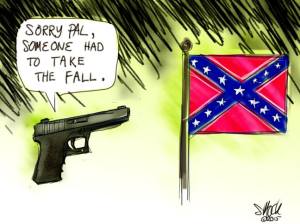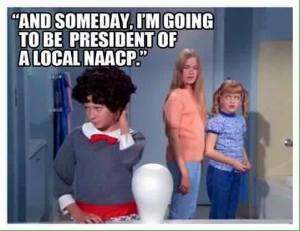Dear Dwonna:
I feel like the (Confederate) flag is about ten percent of the issue. I feel like it is being used as a diversionary tactic to keep the general public ignorant of the fact that we are not dealing with the REAL issue, the guns! Perhaps nine lives would have been spared, perhaps many more lives can be saved. Is my white privilege making me view this incorrectly?
Signed,
Liz
——————————————–
Dear Liz:
I have purposely avoided Facebook as the controversy over the Confederate flag’s place in American iconography is being widely debated in South Carolina and other places throughout the South, and I have to admit that I’ve been disappointed—and at times angry—over how some people I thought were friends have responded. I have held my tongue…until now.
One white man I went to high school with sent me a text that simply said “liberals were winning,” and a former student—a white, feminist, lesbian—wrote on her Facebook wall that there’s no need to remove the Confederate flag since “getting rid of the rebel flag because of a few idiots is like getting rid of the Bible because of the Westboro church. The flag does not have a virus on it that causes people to be stupid.” I have lost a lot of respect for friends and former students I used to like, but I am most disappointed in this white, feminist, lesbian’s stance, mostly because I’ve been a life-long—and very vocal—advocate of the LGBTQI community. Her comment reminds me about why so many African American women like me remain distrustful of white feminists who, when the going gets tough and they must deal with an issue of race, hold on to their white privilege for dear life. Why can’t this former student look beyond her white privilege to see that the flag is a kind of virus that gives its supporters a (silent) platform on which to tell those they encounter what they really think about African Americans?
When I see people flying and/or displaying the Confederate flag—and when I see people defending it as simply a “symbol of southern pride and heritage that isn’t racist”—I cringe, I sometimes get scared, and then I get angry. I am bored with these white folks who tell me that the Confederate flag is simply a symbol of “southern heritage and pride.” Yes, it is a symbol of “southern heritage and pride”: in slavery, in white subjugation of black Americans, in Jim Crow laws, and in state-sanctioned lynchings. I imagine that these people are so proud of their southern heritage because it takes them back to a time when African Americans “knew their place” and did not question nor fight the white power structure in place. Not surprisingly, South Carolina officials placed the Confederate flag on top of its state house building in 1961, at the beginning of the modern-day Civil Rights Movement.
To those who wonder whether or not the Confederate flag is simply a way to distract Americans of conscience from the daily gun violence that pervades our culture, I loudly say “NO.” We need to continue having these very frank, very difficult, and oftentimes very painful conversations about race and racism in this country. Yes, Dylan Roof was able to kill those nine African Americans during a Wednesday-evening bible study at Emmanuel AME church in Charleston, South Carolina, in part because of this country’s lax laws on gun ownership and possession, but let us not forget that Roof felt he needed to execute those African Americans because of what he had been told the Confederate flag stood for: “to maintain the heaven ordained supremacy of the white man over the inferior colored race.” He used the Confederate flag as his symbol of hatred because it is a symbol of hatred.
To my white friends and students who argue that the Confederate flag is simply a symbol of a nostalgic period in southern history and that it, in and of itself, does not “cause” or perpetuate racism, please know this: when I see that flag, fear envelops me. Quickly. I wonder if the person who flies this flag thinks that I am inferior simply because of the color of my skin; I wonder if he (or she) will call me a Nigger and try to “put me in my place”; I wonder if he thinks that I am not worthy to live in the same neighborhood with them because he “knows how we live”; I wonder if they hate me; I really just wonder if I am safe. Please know that your symbol of “southern heritage and pride” symbolizes something else to me and other African Americans: terror and fear.
It’s pathetic that it took the massacre of nine African Americans by a white supremacist who had bought the lies that the Confederate flag is just a symbol of “southern heritage and pride” for companies like Walmart, Amazon, and Ebay, among others, to stop selling Confederate merchandise; they should have done this a long time ago. Still, I’m glad that Alabama quietly removed its Confederate flag from its statehouse and that officials in South Carolina are taking real steps to remove it from their state capitol. The Confederate flag and Confederate symbols—like the Nathan Bedford Forrest statue that stands on the grounds of the Tennessee Capitol—belong in a museum and not in the place where elected officials congregate to do the state’s work.
Listen. I am not so naïve as to think that taking down the Confederate flag from state capitols and making it more difficult to buy online and in stores will immediately change the minds of white supremacists. It is, however, a good first step in healing the wounds of this country’s racist past and sometimes racist present. While I have been disappointed in how some of my white friends have responded to talk of these Confederate symbols, my spirits have been lifted by my white friends who have spoken up to castigate and challenge their white friends to rethink how they interpret these Confederate symbols.
As Martin Luther King, Jr. said, “People fail to get along because they fear each other; they fear each other because they don’t know each other; they don’t know each other because they have not communicated with each other.” If Dylan Roof teaches white and black America nothing else, let him teach us to talk to and with each other—honestly, frankly, and even uncomfortably—about race, racism, and prejudice in this country, and then let’s have this same conversation about the gun fetish that the NRA and other open carry activists advocate and promote. Some 88 people die every day from gun violence, and hundreds more are injured daily. We cannot, like President Obama said in his eulogy of Rev. Clementa Pickney, “remain blind to the unique mayhem that gun violence inflicts upon this nation.” Let us remember that, as Dr. King said, “The time is always right to do the right thing.” That time is today.
Virginia Woolf wrote, “Someone has to die in order that the rest of us should value life more.” Let us honor the lives of those nine men and women who were killed during that fateful Wednesday evening bible study—Rev. Clementa Pinckney, Tywanza Sanders, Cynthia Hurd, Rev. Sharonda Coleman-Singleton, Myra Thompson, Ethel Lance, Rev. Daniel Simmons, Rev. DePayne Middleton-Doctor, and Susie Jackson—by using this tragedy to do what we can to make this country a better place for all. Let us continue to work to remove the Confederate flag from all aspects of American life, and let us work to pass reasonable gun laws that include background checks. Let us be the change we wish to see in the world.

